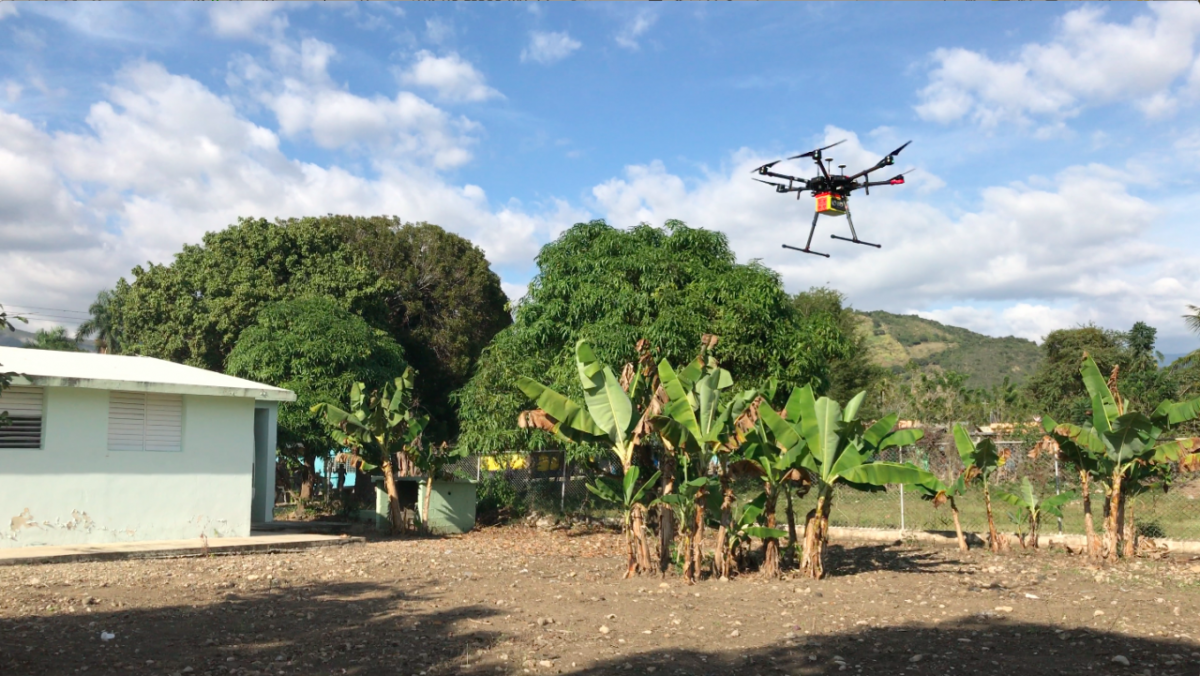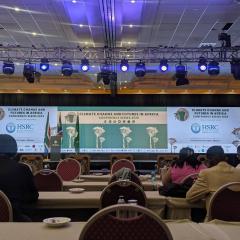
In Conversation with... Audrey Marullaz, Cargo Drone Engineer
July 16th, 2019

Below is a conversation between WeRobotics Co-Founder Patrick Meier and Cargo Drone Engineer Audrey Marullaz.
Science can amuse and fascinate us all, but it is engineering that changes the world.
~ Isaac Asimov
Patrick: When/how did you know that you wanted to study engineering and possibly follow a professional career in this field?
Audrey: I think it was a lucky accident, I didn’t exactly realise what I was signing up for. I always liked math and I was already in a "math and physics" curriculum in high school, but it took me a lot of time to realize that it was the applications rather than the theories that I was interested in. I never had to make a significant choice about my future before selecting a university curriculum. I was extremely unprepared for this decision and gave it surprisingly little thought.
I still wasn’t entirely sure about starting my career in engineering until very recently but I never regretted my curriculum choice. As I realised throughout my studies, an engineering degree teaches you skills more than specific knowledge. You learn to think like a problem-solver and this can be applied to many different fields. Engineers work in finance, management, health, public services, and many other unexpected sectors.
So I still can’t say I chose a career in engineering. I can tell you in 40 years. For now, I chose a career as an engineer.
Patrick: What did you study/do whilst at university which helped you pursue your interests in engineering? What do you wish you had done in hindsight? What would you do differently? Was there a course that you feel was particularly useful or wish that you had taken?
Audrey: I studied microengineering at the Swiss Federal Institute of Technology in Lausanne (EPFL), with a specialisation in robotics and autonomous systems, as well as a minor in energy. My choice of courses resulted in a broad and varied set, mostly because I chose according to my interests at the time without really having a specific focus. I would recommend taking more informed decisions. A little bit of online research, talking to professors or professionals, listening to podcasts and reading articles about a field of interest can help figure out the basic realities and trends of specific domains and help make more targeted choices.
One thing I did and would definitely recommend is to take part in a multidisciplinary project. I participated in the second edition of the China Hardware Innovation Camp (CHIC) in which engineering, design and business students work together in teams to develop a connected device and build a first prototype in Shenzhen, China. Besides technical skills, we learned to communicate with people of different backgrounds, to pitch our ideas, and to understand the importance of non-technical considerations in a project, which are all very valuable skills that we don’t learn in a classroom. EPFL offers many such projects like the Hyperloop Pod Competition, the Solar Decathlon, the Hydrocontest, Uni Arctic, etc.
I would also recommend to get involved in a student organisation which, besides being a lot of fun since there is one for every taste, also prepares you for some aspects of a working environment and can count as valuable experience.
When I explained my job to someone I met in Nepal, I got this comment: 'It’s nice to see that drones are not only for bombs and Instagram pictures.' I was excited to have the opportunity to work on new technology that has a lot of potential and challenges
Patrick: Why did you decide to join WeRobotics not another organization? What projects have you been working on at WeRobotics?
Audrey: When I explained my job to someone I met in Nepal, I got this comment: "It’s nice to see that drones are not only for bombs and Instagram pictures." I think it describes relatively well the way I felt when I first heard about WeRobotics. I was excited to have the opportunity to work on new technology that has a lot of potential and challenges, and to join a small dynamic team where everyone is valued and has a chance to contribute actively, where ideas fly around all the time and things move fast.
I have been working on two cargo drone projects in which the goal is to transport medical goods between hard-to-reach rural clinics in developing countries and the nearest hospital. My responsibility is to develop an Android ground control app to automate and simplify the use of our cargo drones. The objective is that local people on the field can use the system without complex and extensive training and without an engineering or drone piloting background. It involves managing the communication with the drone, displaying useful flight information, designing intuitive and easy to use safety features and procedures and recording flight logs among other things.
Patrick: You recently came back from a project in Nepal. What were you doing there? What did you find surprising?
Audrey: We went to Nepal to implement our drone delivery system in order to help the fight against tuberculosis by transporting sputum samples for analysis at the hospital. It was super interesting and humbling to see our system take its place in a much larger scheme to fight tuberculosis, including health workers training, smart pillboxes and a revolutionary automated diagnostic machine. The potential impact of our work also became much clearer to me. When we went to visit one of the health posts on the hills, it took an hour to reach it with the jeep on an extremely bumpy and scary road (enough so that we decided to hike down). The drone would take less than 10 minutes for the same trip.
As usual for WeRobotics, we were working with our local Flying Labs to ensure smooth collaboration with the authorities and stakeholders, availability of trained Nepali drone pilots and knowledge of the local culture and environment. The Nepali business customs are so different from ours that we would probably never have gotten the project running on our own. Respect for the hierarchies and procedures is of the utmost importance and we had to participate in a few official meetings to get support and authorisations for the project. The demo in front of all these police, army and government representatives was definitely not the most relaxing part of the day, even though not too technically challenging.
However, once on board, officials and staff were extremely dedicated to the project. For example, they agreed to open the hospital administrative building for us on a strike day, or after working hours. They even cut a tree at one of the health posts because we mentioned that its proximity to our landing site was worrying us.
Patrick: You were also in the Dominican Republic for a project. What did you find most insightful about that project?
Audrey: The trip to the Dominican Republic was my first field expedition. It was a bit stressful, especially on the way there with all the equipment. A 10 kg drone is not such a common sight and explaining its purpose to the Dominican customs in my 2-months-of-Duolingo-Spanish was not that straightforward. Luckily they were mostly curious and we had the right paperwork (once again thanks to our local Flying Lab).
It took us a day to realise that the drone pilots we were training to operate our system didn't understand English too well, despite their initial claims. So we got creative: using more visuals, asking questions to the one who understood so that they could summarise in Spanish, pairing them differently for the exercises and organising a written translation of the standard operating procedures. In the end, it all worked out pretty well. Of course engineering projects never go exactly as planned, and we had to face unexpected situations and solve issues as they arose. We started by transporting chocolate snacks and mangoes from the nearby trees to prove the system before transporting valuable medicines. At least it made the kids in the hills happy.
Patrick: Do you have any advice to give to current students on how to get from the current degree they're studying for to where you are?
Audrey: A degree in robotics is probably the most straightforward way to working with drones. Anything related to electronics, mechanics or programming is useful. Drones are still relatively new, especially in the cargo space, and they offer plenty of wonderful opportunities. There is a lot of work to do for the general public to become accustomed to them as something else than bombs droppers and Instagram pictures takers.
STEM subjects have a reputation of being more difficult. Engineering studies do require hard work but being motivated and interested in what you are studying takes you a long way. Enjoying what you do is a very important part of being successful. As Einstein said, "I have no special talent. I am only passionately curious."
Enjoying what you do is a very important part of being successful. As Einstein said, "I have no special talent. I am only passionately curious."
You should be prepared for a good amount of math and physics in the first years, but some fun projects and practical courses should compensate for that. Towards the end of your bachelor's degree and during your master's degree, you usually have more freedom in your choice of courses and also get more projects and lab work. Engineering schools also offer a great community feeling and a lot of collaboration, as opposed to competitive studies such as medicine. It definitely helps to go through the exam period and project deadlines with friends, as well as celebrate together afterwards. This is even more true in the multidisciplinary projects I mentioned above, which usually end in a competition or public demonstration. Seeing everything come together, and sharing this moment with your team is extremely rewarding.
I want to conclude with this quote from Isaac Asimov: "Science can amuse and fascinate us all, but it is engineering that changes the world."
Recent Articles

